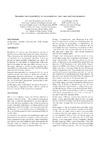Please use this identifier to cite or link to this item:
https://accedacris.ulpgc.es/jspui/handle/10553/56248
| Title: | Semantic interoperability in co-simulation: use cases and requirements | Authors: | Evora Gomez,Jose Hernández Cabrera, José Juan Tavella, Jean-Philippe |
UNESCO Clasification: | 33 Ciencias tecnológicas | Keywords: | Co-simulation tool Semantic interoperability FMI Domain specific language |
Issue Date: | 2016 | Abstract: | Simulation of complex and heterogeneous systems is done by decomposing the system into many subsystems. These subsystems are individually simulated and results are integrated by a co-simulation algorithm. In this approach, an interoperability framework that allows the integration of components is required.The FMI standard is becoming the interoperability reference for co-simulation, although it is still evolving. Semantic interoperability is an interesting issue that the FMI standard could include in future versions. Semantic interoperability is concerned with the use of explicit semantic descriptions to define how simulation components should be associated. In simulation, this issue is especially important as it provides essential support for cross-domain integration, guaranteeing consistency and composability. In this paper, some co-simulation use cases and semantic interoperability requirements that could be considered in future versions of the standard are analysed. | URI: | https://accedacris.ulpgc.es/handle/10553/56248 | Source: | 30th European Simulation and Modelling Conference · ESM 2016, octubre, Las Palmas de Gran Canaria, Spain, p. 5-9 |
| Appears in Collections: | Actas de congresos |
Page view(s)
191
checked on Jul 12, 2025
Download(s)
147
checked on Jul 12, 2025
Google ScholarTM
Check
Share
Export metadata
Items in accedaCRIS are protected by copyright, with all rights reserved, unless otherwise indicated.
